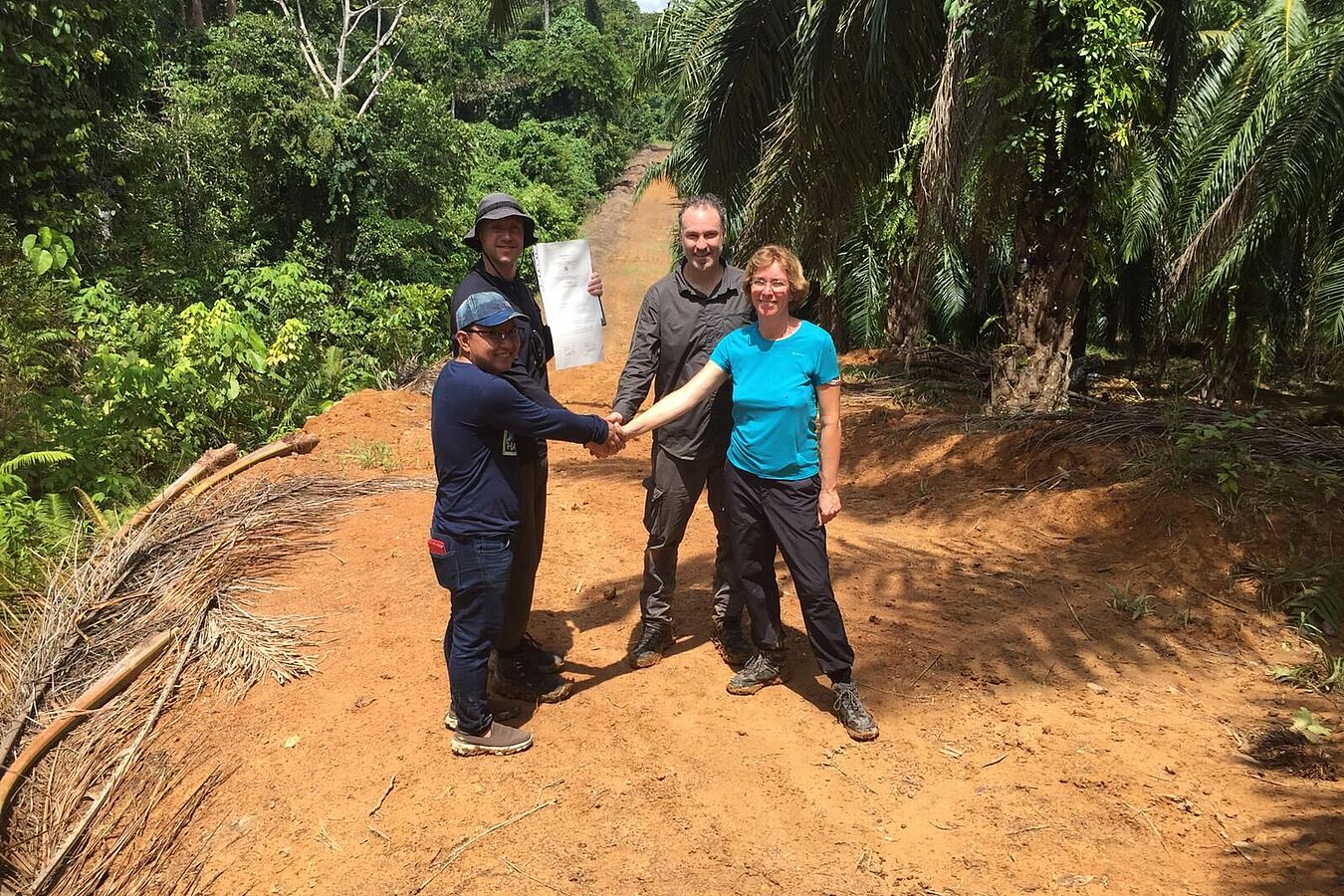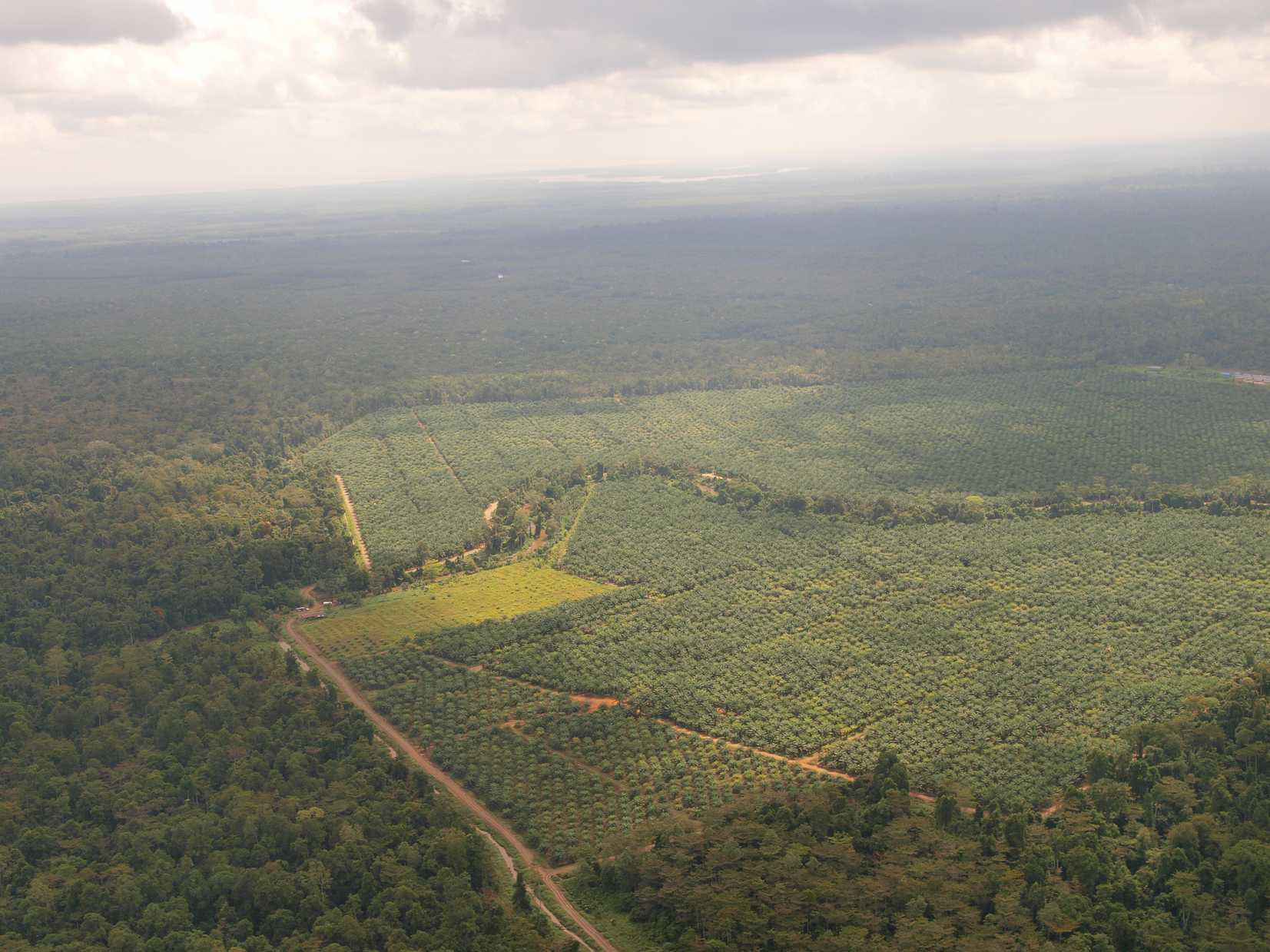In this way, an important wildlife corridor can be restored. The research project is to serve as a blueprint for future conversion measures in Malaysia and Indonesia. The pilot project makes an important contribution to nature, species and climate protection.
The protection of the original rainforest and its near-natural restoration is an important course of action in the fight against climate change and the extinction of species. This measure not only benefits habitats and biodiversity, it enables humans to stabilise their livelihoods.
The nature and species conservation organisation Borneo Orangutan Survival (BOS) Deutschland e. V. is a new partner of the Rhino and Forest Fund (RFF) and the Leibniz Institute for Zoo and Wildlife Research (Leibniz-IZW). It supports the RFF and Leibniz-IZW by financing the purchase of important land on Borneo. The aim is to recover central habitats from the palm oil industry in order to convert them back into near-natural rainforest. This will restore the high biodiversity of the tropical rainforests on Borneo in Malaysia. The aim is to establish a wildlife corridor between the Tabin and Kulamba protected areas in the east of the Malaysian state of Sabah. Currently, the protected areas are separated by oil palm plantations. These plantations pose a particular threat to orangutans and dwarf elephants. The animals go to the plantations in search of food and are often killed there because ofthe damage they cause.
The first step in establishing the wildlife corridor is to secure the central palm oil cultivation areas and the adjacent areas. Thanks to BOS Germany, further important areas can now be purchased. In the next step, the areas will be transferred to the Government of Malaysia, which will then transfer these areas to the highest protection status ("Protected Forest Reserve Class 7"). Afterwards, with the support of the Leibniz-IZW, research will be conducted into the best way to convert oil palm plantations into near-natural rainforests and how the newly acquired habitat is used by wild animals. Researchers see the danger of palm oil monocultures destroying the soil in the long term. These degraded areas can then be used less and less for agricultural purposes.
The researchers aim to develop a blue print for converting overused agricultural areas – such as oil palm plantations - to near-natural rainforests. The research findings from this pilot project can then be transferred to other areas in Malaysia, but also in Indonesia.
Iman, the last Sumatran rhino in Malaysia, died on 23.11.2019. This tragedy was caused by various factors such as illegal hunting, fragmentation and destruction of habitat. Our goal is to prevent such catastrophes for other animal species such as the orang-utan or the Borneo elephant.
"This is our first project in Malaysia. Here we can make an enormous contribution to the conservation of endangered wildlife. Tabin and Kulamba are indispensable retreats not only for the Borneo orangutan, but also for the hair-nosed otter, the Sunda-clouded leopard, the Borneo elephant and the Borneo banteng and numerous other endangered species," explains Daniel Merdes, Managing Director of BOS Germany.
"BOS Germany's contribution will enable us to establish a wildlife corridor at least 800 metres wide. In order to expand the corridor further, we are dependent on further support. The acquisition of private plantation areas is an indispensable measure to reconnect already fragmented forest areas and to give endangered species a longer-term survival perspective," says Robert Risch, RFF board member.
The aim is to convert the acquired oil palm plantations into natural-near rainforest and to document this process scientifically. "I am particularly interested in the reintroduction of wildlife into areas with few species," explains Dr Petra Kretzschmar, ecologist at Leibniz-IZW and board member at the RFF. "We would like to find out how long it takes for palm oil plantations with few wildlife species to regain their original biodiversity after renaturation.”
In Southeast Asia, deforestation mainly affects the ecologically valuable lowland rainforests, which are predominantly replaced by oil palm plantations and other monocultures. However, this intensive agricultural use not only destroys the habitats of many animal and plant species, but also causes lasting damage to the soil and climate.
"The alliance of RFF, BOS, Leibniz-IZW and Sabah Forestry Department makes an important contribution to the UN Sustainability Development Goal 13: Climate Action: Take urgent action to combat climate change and its impacts, and Goal 15: Life on Land: Protect, restore and promote sustainable use of terrestrial ecosystems, sustainably manage forests, combat desertification, and halt and reverse land degradation and halt biodiversity loss," explains Steven Seet, Head of Public Relations at Leibniz-IZW and board member of the RFF. "Now that the areas have been secured, it is important to deliver evidence-based results. How does the optimal conversion process from oil palm plantations to rainforest and the use of the newly gained areas by wild animals look like? In order to answer these central questions, we are currently looking for financial support and additional cooperation partners.”
Rhino and Forest Fund (RFF) e.V.
The RFF is a science-based nature and species conservation organisation that is primarily active in Indonesia and Malaysia. The aims of the RFF are the protection of flora and fauna in ecologically valuable rainforests, climate protection policy and the realisation of scientific model projects for the conservation and restoration of near-natural rainforests. The RFF is a spin-off of Leibniz-IZW.
Borneo Orangutan Survival (BOS) Deutschland e.V.
In an international network of partner organisations BOS Deutschland e.V. protects the Borneo orangutan. In two Indonesian rescue stations, injured and orphaned animals are taken in, cared for and rehabilitated so that they can be released into the wild again at the end of their training. BOS opens up new protected areas in which wild orangutans can live freely and reforests destroyed rainforest areas. In addition, BOS Germany carries out important educational and public relations work to sensitize people to the acute emergency situation of orangutans. BOS pursues a holistic approach in its work, which also includes the local authorities and communities, because only hand in hand is it possible to ensure the sustainable survival of the orangutan.
Leibniz-Institut für Zoo- und Wildtierforschung (Leibniz-IZW)
The Leibniz-IZW is an interdisciplinary research institution that investigates the adaptation of wild animals - from the molecular to the landscape level - to changing environmental conditions and thus develops the scientific basis for innovative conservation.
Images
Image material for royalty-free use in connection with reporting on and mentioning the Alliance and use of the copyright stated in the image description.



